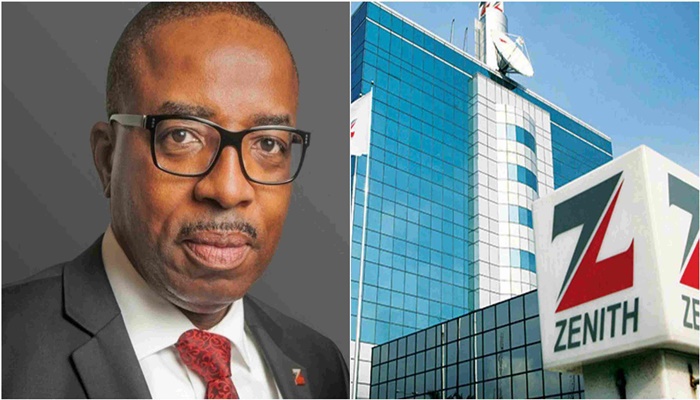
- Proposes N.30 per share interim dividend
Zenith Bank Plc presented its first-half of 2020 financial reports to The Nigerian Stock Exchange (NSE) on Thursday with stronger profitability as its profit-before-tax settling at 2.2 per cent higher year-on-year, however, profit-after-tax settled 16.8 per cent higher year-on-year, on account of a 54.8 per cent decline in income tax expense.
The account shows that the bank’s operating expenses grew by 7.1 per cent year-on-year to N135.85 billion as the bank continued to focus on cost management in the face of moderate gross earnings growth, even as operating expenses such as I.T, and maintenance costs came to 16.6 per cent year0on0year to N21.22 billion.
As a result of this, growth relative to operating income growth, the bank’s cost-to-income ratio settled higher at 54.3 per cent relative to 52.7 per cent and 50.9 per cent in the prior quarter and the corresponding period of the prior year.
The bank recorded strong earnings growth over the corresponding period of the prior year as its earnings per share (EPS) of N3.30 is 16.6 per cent higher than what it was in first half of 2019 and the board has proposed an interim dividend of N0.30 per share, same as the same period of 2-19 which equates to a yield of 1.7 per cent based on the closing price of N17.20 as of the 3rd of September, 2020.
Its interest income grew marginally by 1.1 per cent year-on-year to NGN216.95 billion. The major boost here is the income from loans and advances to customers which stood at 11.6 per cent year-on-year to N128.37 billion. The bank’s risk asset creation was strong in the period under review as it came to 13.8 per cent year-to-date to N2.62 trillion.
However, other contributory line recorded a decline as investment securities recorded negative 18.1 per cent year-on-year. This is not surprising as yields across assets have pared significantly from the prior year.
The bank recorded an interest expense declined by 17.4 per cent year-on-year to N59.55 billion, reflecting lower interest cost on borrowings over the corresponding period of the prior year at -50.7 per cent to N17.00 billion. The increase in cost of deposits from customers which was +13.3 per cent to N42.54 billion, could not change the situation. Consequent to the decline in interest expense, net interest income settled higher by 10.5 per cent year-on-year at N157.41 billion. After accounting for credit impairment charges of 74.2 per cent year-on-year to N23.92 billion, net interest income settled 3.7 per cent higher year-on-year.
Despite challenges, the bank’s non-interest income was strong in the period under review, settling 6.2 per cent, higher at N116.49 billion year-on-year. The strong growth recorded was supported by expansions in forex revaluation gains of 239.6 per cent year-on-year to N22.02 billion as well as gains on investment securities of 30.4 per cent year-on-year to N58.83 billion. This expansion in non-interest income alongside led to an expansion in operating income of 4.8 per cent to N249.97 billion.
It should be noted that the bank’s macro-prudential ratios remain strong, as all ratios settled within statutory limits as its non-performing loans ratio improved to 4.7 per cent from 5.0 per cent in the prior quarter. Similarly, the bank’s capital adequacy of 20.0 per cent and liquidity 43.8 per cent ratios remained strong. However, the bank’s current loans-to-deposits ratio of 66.1 per cent is now above the minimum LDR of 65.0 per cent as prescribed by Central Bank of Nigeria (CBN).






